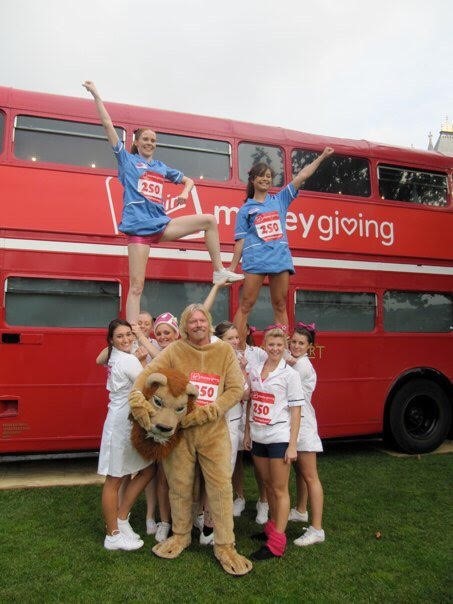Elizabeth Galbut is the co-founder of SoGal Ventures, the first female-led millennial venture capital firm.
Ricky: Tell us about yourself.
Elizabeth: I’ve been in the healthcare space my entire life and also came from an entrepreneurial background. I always enjoyed identifying problems and coming up with creative solutions. In Georgetown, I accidentally majored  in economics. And as a sophomore, I interviewed with Deloitte, which ended up being my only interview in college, and was accepted into their leadership program. There I worked as a strategy and operations consultant, specifically working with healthcare clients. We worked on merger and acquisition cases which is when I started to get interested in working with startups in the healthcare space. I noticed that there was this mass emergence of technology in this industry. After working at Deloitte for three years, I got an MBA and MA from Johns Hopkins University and Maryland Institute College of Art.
in economics. And as a sophomore, I interviewed with Deloitte, which ended up being my only interview in college, and was accepted into their leadership program. There I worked as a strategy and operations consultant, specifically working with healthcare clients. We worked on merger and acquisition cases which is when I started to get interested in working with startups in the healthcare space. I noticed that there was this mass emergence of technology in this industry. After working at Deloitte for three years, I got an MBA and MA from Johns Hopkins University and Maryland Institute College of Art.
R: Why did you decide to pursue an MBA and MA?
E: This program was the perfect combination for me because it encompassed Hopkins’ expertise in healthcare while allowing me to express my artistic side, which I had felt was suppressed in consulting. I was particularly intrigued by the idea of design thinking and having empathy for human needs.
R: How did you gain experience in venture capital before starting SoGal Ventures?
E: At Hopkins, I was the Managing Director of their Innovation Factory where I lead 52 student leaders. I noticed that there was a huge lack of early stage capital for student entrepreneurs. This led me to create A-Level Capital with two other students and we have made seven investments thus far. From there, I was encouraged by Dave McClure, founder of 500 Startups and Hopkins alum, to apply to Stanford’s + 500 Startups VC Unlocked program. I was accepted into the program, and Dave is now an investor and advisor for A-Level Capital. At this program, I met Pocket Sun, the co-founder of SoGal Ventures, and we were advised to spend 1-2 years raising our own fund in order to create a culture we would enjoy rather than working for other venture capital firms.
R: What led you to start SoGal Ventures?
E: Venture capital firms tend to invest only in companies within a few driving hours distance from their home office. However, Pocket and I both saw that there were a lot of interesting macro trends occurring in the startup space now, and it was much easier to invest on a global scale. Additionally, we truly believe that millennials crave a human connection, and technology has radically changed how they consume. There is this huge increase in connectivity; however, millennials still feel alone and find it difficult to find a purpose. We wanted to invest in companies on a global scale that are positive forces in the technology industry while mostly being founded by millennials.
R: Give us a rundown of your daily routine.
E: Every day is radically different, but my days tend to consist of meetings. I am constantly reaching out to people for networking purposes and raising money. These meetings are usually with entrepreneurs and are about building relationships and understanding their companies. But I also keep in touch with startups that we have funded in order to help them further their companies.
R: What is the biggest challenge you run into at work?
E: Honestly, my biggest challenge is making time for myself. Because I travel a lot, I can easily be working 11 at night and not realize the time. Starting a business is consuming, but I have to constantly remind myself to take a step back and relax a bit.
R: You mentioned in your article that “successful investors train themselves to understand and value deviations from the norm.” Can you elaborate on what it means to deviate from the norm?
E: People try and place previous beliefs and value propositions when evaluating new companies. For example, when you see a nerdy guy you usually assume that he is a good developer and can easily create a successful, tech company. However, when you see a reserved Indian girl who is a first generation college student, it is much harder to see her succeed in the same context. Deviating from the norm means putting biases aside and really taking the time to evaluate a business logically. Additionally, deviating from the norm means to not apply the same business model to a new company. There is this trend of placing businesses into the “Uber of this” or “Airbnb of that” categories. This pattern recognition is harmful for an investor. In order to evaluate a correct investment, you have to try to get rid of that habit.
R: Have you noticed any differences between female and male founders?
E: Females tend to be more realistic in their projections. They don’t want to overpromise and underdeliver. Whereas, males tend to have more ambitious forecasts that aren’t necessarily realistic. Furthermore, females are great at being collaborative, building a solid team and being able to get resources to build their businesses for cheap. They are better at convincing someone of the value of what they are building and have a sound understanding of how to get someone excited about their businesses. The biggest difference I’ve seen is that females are far more focused on building relationships whereas males lean towards treating their relationships like transactions.
R: Why should there be more women in VC?
E: It is a smart business practice to have a gender diverse investing team. Women power the majority of consumption decisions; however, 70% of VCs have never hired a woman in an investing position. All male teams tend to not understand businesses that deal with family, fashion, beauty, and technology generally aimed at the female population. When that voice is missing on an investing team, there is a higher chance of missing great deals and opportunities.
R: Why do you think there is that gender gap?
E: Let me share a personal story. Back in high school, I was a mathlete and I got an 800 on the math portion of the SAT. Math is an integral part of engineering, but no one ever thought to encourage me to pursue engineering. We didn’t even have conversations about why that was the matter. However, I truly believe that there has been positive change over long progressions of time, and it is a great sign that these interesting conversations about the gender gap in several industries is occurring now.
R: Do you have any advice for girls who are considering pursuing a career in venture capital?
E: Read up on the industry as much as you can, including blogs and podcasts. You should even try to create a mock portfolio of interesting companies you encounter and list why you would or wouldn’t invest in them. You can learn from this, and it also conveys your interest in interviews.
R: What is the most interesting company you have encountered?
E: GiveCampus is a company that we invested in, and it runs online campaigns for colleges that aims to gamify and socialize alumni donations.
R: Can you share a fun fact about yourself?
 E: Back in Georgetown, I was on the cheerleading team, and we got to perform at the Verizon Center where the basketball team would play. Presidents were known to show up at these games. So, there was one game when I was performing and noticed Bill Clinton was standing a couple of feet from us. I was awestruck and proceeded to mess up the routine. Also, when I was studying abroad in the London School of Economics, I was in a cheerleading stunt with Richard Branson for a promotional campaign where we (the cheerleaders) dressed up as nurses and he was dressed up as a lion.
E: Back in Georgetown, I was on the cheerleading team, and we got to perform at the Verizon Center where the basketball team would play. Presidents were known to show up at these games. So, there was one game when I was performing and noticed Bill Clinton was standing a couple of feet from us. I was awestruck and proceeded to mess up the routine. Also, when I was studying abroad in the London School of Economics, I was in a cheerleading stunt with Richard Branson for a promotional campaign where we (the cheerleaders) dressed up as nurses and he was dressed up as a lion.
R: Favorite read?
E: Bloomberg Businessweek.
R: How do you take your coffee?
E: I don’t drink coffee. I love peppermint tea with a lot of brown sugar. I also happen to be a huge carb monster.
Contributor: Ricky Rajani



d1234 February 21, 2016 at 8:36pm
This article is very insightful. It adds another possible career to my list! 🙂